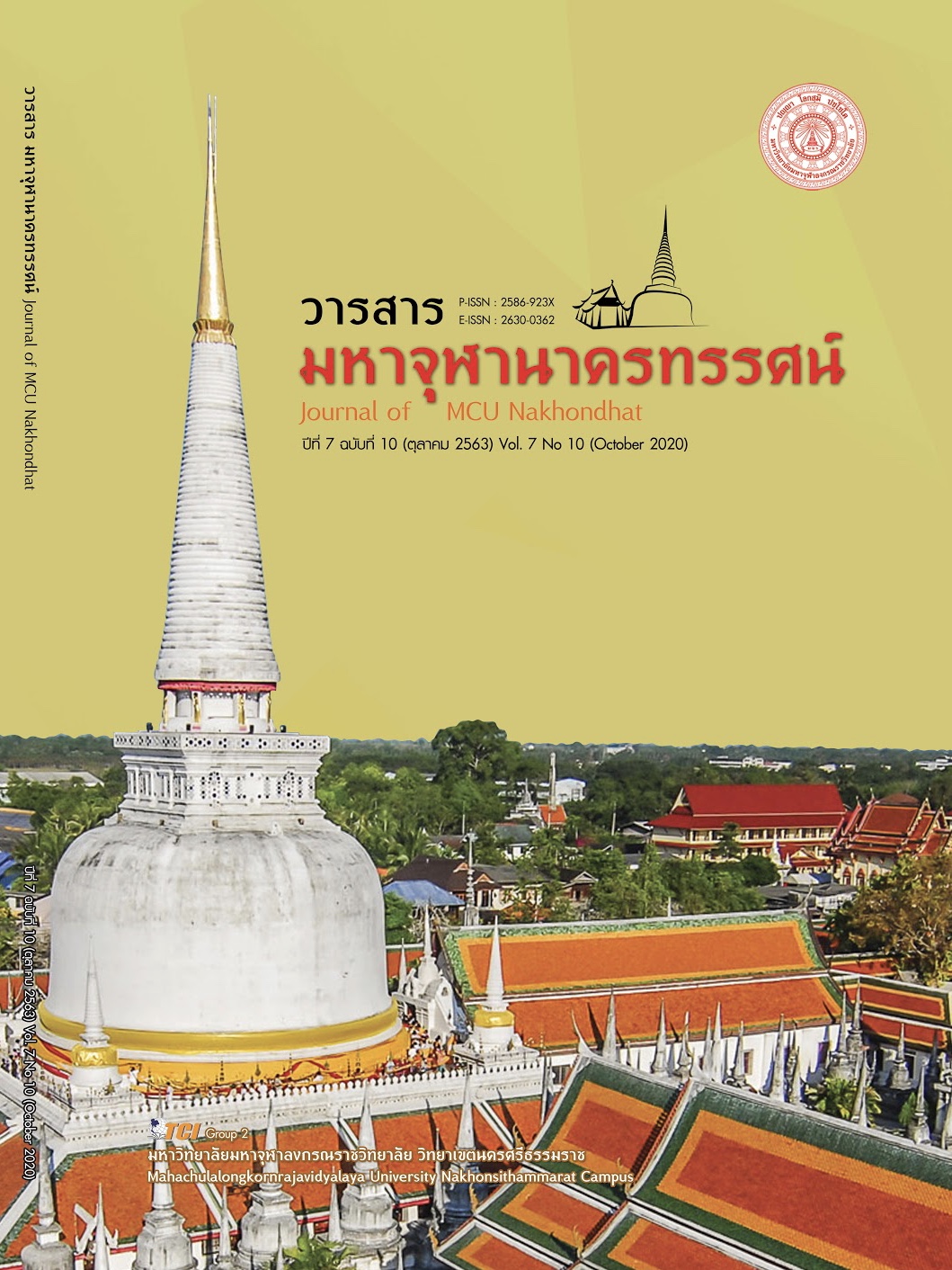POLITICAL DEVELOPMENT IN ACCORDANCE WITH BUDDHIST PRINCIPLES
Main Article Content
Abstract
Thailand ruled in a democratic system with the King as Head of State. There is a rapid development resulting in increased prosperity in various fields resulting in problems to the politics of the country. These crises are caused by conflicts between existing political groups. There are people who support and who resist and also reflects the inequality and division between urban and rural residents. Therefore causing Thai politics to turmoil, with no end to end. In the base of community leaders, social leaders and national leaders, they must be fair, that is, govern with respect for principles, rules, and regulations, and build up love, unity, bond and solidarity among the people. Share things that are not self - possessive Behave in good faith Respect and listen to each other's opinions And must be honest, physically, verbally and mentally in order to be a good and appropriate role model for people, communities and society to help develop Thai politics.
Therefore, Buddhism is one way that can be used to solve the crisis very well as it is a principle for political development especially. From the lack of political ethics of the Thai people In matters of purchasing the right to sell votes in the public elections With politicians in pursuit of too much self and their own interests With non - fulfillment of promises made to the people before the election Fundamentals of political leaders must be honest in their body, speech and mind to be a suitable role model for people, community and society to help develop Thai politics. With the introduction of Buddhist principles for political development in the present.
Article Details
References
โฆสิต ปั่นเปี่ยมรัษฎ์. (2549). การศึกษาและการพัฒนาชุมชน. (พิมพ์ครั้งที่ 1). กรุงเทพมหานคร: สำนักพิมพ์ โอ.เอส.พริ้นติ้งเฮ้าส์.
ชาญวิทย์ ปรีชาพาณิชพัฒนา. (2563). สังคมศึกษา ศาสนา และวัฒนธรรม. เรียกใช้เมื่อ 21 กรกฎาคม 2563 จาก https://sites.google.com/site/janisataprombut/3-rabxb-kar-pkkhrxng-khxng-prathes/01
ฑิตยา สุวรรณชฎ. (2527). สังคมวิทยา. กรุงเทพมหานคร: ไทยวัฒนาพานิช.
. (2517). สังคมวิทยาในวิทยาศาสตร์สังคม. กรุงเทพมหานคร: สำนักวิจัยสถาบันบัณฑิตพัฒนบริหารศาสตร์.
ประเวศ วะสี. (2541). ประชาคมตำบล. (พิมพ์ครั้งที่ 2). กรุงเทพมหานคร: มติชน.
พัฒน์ บุณยรัตพันธ์. (2549). การสร้างพลังชุมชนโดยขบวนการพัฒนาชุมชน. (พิมพ์ครั้งที่ 2). กรุงเทพมหานคร: บริษัทเลิฟและลิพเพรสจำกัด.
มหาจุฬาลงกรณราชวิทยาลัย. (2539). พระไตรปิฎกภาษาไทย ฉบับมหาจุฬาลงกรณราชวิทยาลัย. กรุงเทพมหานคร: โรงพิมพ์มหาจุฬาลงกรณราชวิทยาลัย.
ยุวัฒน์ วุฒิเมธี. (2526). หลักการพัฒนาชุมชนและการพัฒนาชนบท. กรุงเทพมหานคร: ไทยอนุเคราะห์ไทย.
วิรัช วิรัชนิภาวรรณ. (2549). การพัฒนาเมืองและชนบทประยุกต์. (พิมพ์ครั้งที่ 1). กรุงเทพมหานคร: สำนักพิมพ์ฟอร์เพช.
สนธยา พลศรี. (2550). เครือข่ายการเรียนรู้งานพัฒนาชุมชน. (พิมพ์ครั้งที่ 2). กรุงเทพมหานคร: โอ.เอส.พริ้นติ้งเฮ้าส์.
สมศักดิ์ ศรีสันติสุข. (2525). สังคมไทย: แนวทางวิจัยและการพัฒนา. กรุงเทพมหานคร: สถาบันวิจัยพฤติกรรมศาสตร์.
สัญญา สัญญาวิวัฒน์. (2540). ทฤษฎีและกลยุทธ์การพัฒนาสังคม. (พิมพ์ครั้งที่ 2). กรุงเทพมหานคร: สำนักพิมพ์แห่งจุฬาลงกรณ์มหาวิทยาลัย.
สำนักงานเลขาธิการสภาผู้แทนราษฎรแห่งราชอาณาจักรไทย. (2560). การพัฒนาการเมืองการปกครองในระบอบประชาธิปไตย. กรุงเทพมหานคร: สำนักงานเลขาธิการสภาผู้แทนราษฎร.
เสาวนุช ศิริมาลัยรักษ์. (2560). ศึกษาความสำคัญของสุจริต 3 ต่อการปฏิบัติวิปัสสนาภาวนา. ใน วิทยานิพนธ์พุทธศาสตรมหาบัณฑิต สาขาวิชาพระพุทธศาสนา. มหาวิทยาลัยมหาจุฬาลงกรณราชวิทยาลัย.


